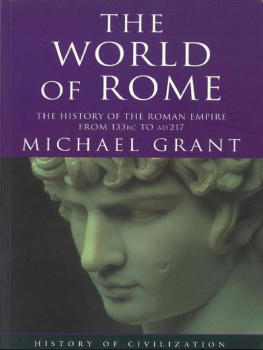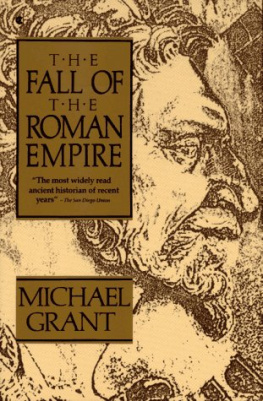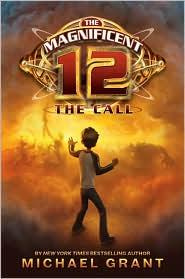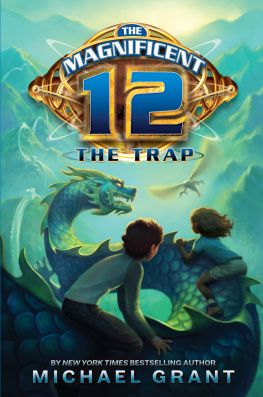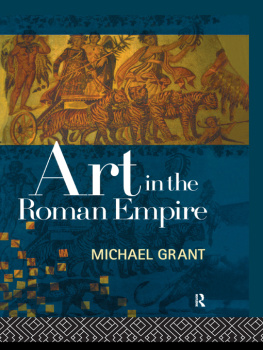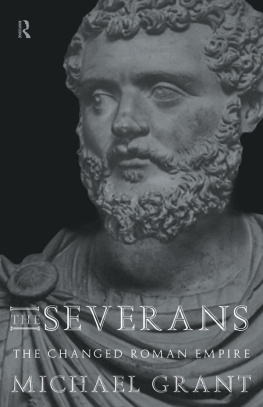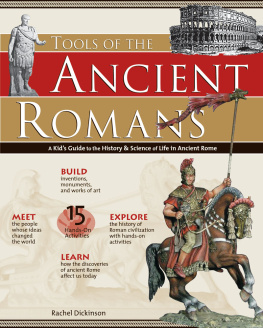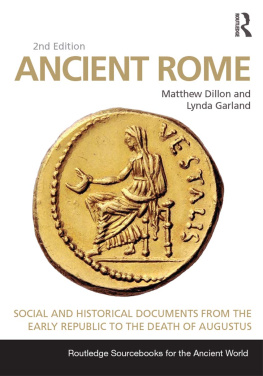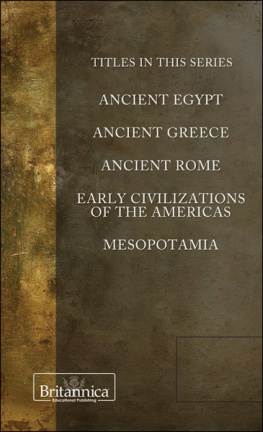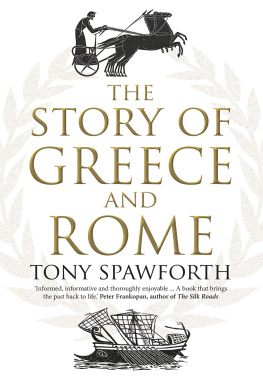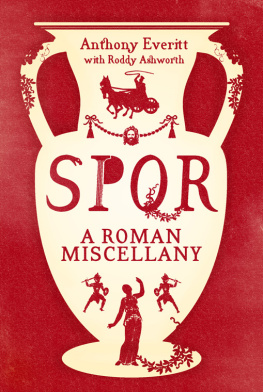CONTENTS
LIST OF PLATES
LIST OF ILLUSTRATIONS IN TEXT
LIST OF MAPS
FOREWORD
PART I. THE ROMAN EMPIRE
1 HISTORICAL SKETCH
PART II. STATE AND SOCIETY
2 THE RULERS AND THE EMPIRE
3 CITIZENS OF ROME
4 SUBJECTS AND SLAVES
PART III. BELIEFS
5 FATE AND THE STARS
6 RELIGION
7 PHILOSOPHY
PART IV. LITERATURE AND THE ARTS
8 THE GREAT LATIN WRITERS
9 SCULPTURE AND PAINTING
10 ARCHITECTURE
EPILOGUE
NOTES
NOTES FOR FURTHER READING
INDEX
COPYRIGHT
To ANNE-SOPHIE
Michael Grant (1914-2004) is a highly successful and renowned historian of the ancient world. He has held many academic posts including those of Fellow of Trinity College, Cambridge; Professor of Humanity at Edinburgh University; Vice Chancellor of The Queens University, Belfast and Vice Chancellor of the University of Khartoum. He is a Doctor of Letters at Dublin and a Doctor of Laws at Belfast. He has also been President of the Classical Association of England, the Virgil Society and the Royal Numismatic Society, and is a Medallist of the American Numismatic Society.
A SELECTION OF WORKS BY MICHAEL GRANT
The Twelve Caesars
The Classical Greeks
The Climax of Rome
The Fall of the Roman Empire
The Roman Emperors
The Rise of the Greeks
The Myths of the Greeks and Romans
The History of Ancient Israel
The Jews in the Roman World
The Roman World
Cleopatra
Cities of Vesuvius
THE WORLD OF ROME
HISTORY OF CIVILIZATION
For more than thirty years this distinguished series has provided the general reader with a comprehensive picture of the worlds greatest civilizations. The series is free from commitment to any single interpretation of history, and seeks to go beyond the standard works of reference. It presents individual and original evocations, by leading scholars in many countries, of the culture and development of a nation, groups of nations or period of history.
The following books in the series
are all available in Phoenix Press editions:
The Japanese Experience, W.G. Beasley
The English Experience, John Bowle
The Greek Experience, C.M. Bowra
The Chinese Experience, Raymond Dawson
The Celtic Realms, Myles Dillon and Nora Chadwick
The Golden Age of Persia, Richard Frye
The World of Rome, Michael Grant
The Climax of Rome, Michael Grant
The Medieval World, Friedrich Heer
The Age of Revolution 17891848, Eric Hobsbawm
The Age of Capital 18481875, Eric Hobsbawm
The Age of Empire 18751914, Eric Hobsbawm
Ancient American Civilisations, Freidrich Katz
The Middle East, Bernard Lewis
Byzantium, Cyril Mango
Eternal Egypt, Pierre Montet
The World of the Phoenicians, Sabatino Moscati
The Byzantine Commonwealth, Dimitri Obolensky
The African Experience Roland Oliver
The Decline of Rome, Joseph Vogt
b ) seen from air (Photo: Mansell Collection: Alinari 41236)
T HIS book is intended to give a picture of the world of the Romans during the three hundred and fifty years when, at the height of their unparalleled power, they made their greatest impact on the world, and received most from it in exchange. After a sketch of the historical background I shall try to single out the achievements and activities in the Roman empire which look to me, for good or ill, most fundamental to our understanding of its place in history.
Imperial Rome has seemed, to the people of many later centuries, a peculiarly enthralling and moving theme, and that is what it remainsunique, terrible, and rich in allurements and astonishments. I shall be happy if in this book I can transmit even a small charge of its versatile, potent magnetism. The material that has come down to us, though in many respects fragmentary, is nevertheless massive; and, from the sometimes bewilderingly contradictory variety that it offers, no two writers will ever make the same personal selection. My own account of this Roman Experience, perhaps because I have spent seven years in near and middle eastern countries, dwells more than most upon its inextricable, creative fusion of elements originating not only from Italy and the main-land of Greece but from farther Mediterranean coasts as well.
Political, social and economic conditions will first be briefly surveyed, and then something will be said of the more intimate thoughts, feelings and achievements both of the majority among the great populations of the empire and of their minority: that is to say, attention will first be directed to the religious hopes and beliefs which preoccupied millions, and then to the intellectual and artistic creations of a few small, talented groups and individuals.
The story runs from 133 BC to AD 217. The selection of any starting-date cannot help being somewhat artificial; but the year chosen here witnessed the first notable protests by Romans against parochial narrowness, and strainings after a new sort of state capable of ruling the empire that they had now won. Moreover, within the same few months, the rapid process of imperial expansion reached its climax with Romes annexation of a region which was to exert great influence upon its affairs, the province of Asia in western Asia Minor (Anatolia). The book ends with the decline of the Roman Peace and of its characteristic institutions. As a terminal date I have chosen, among several possible dates during this process, the year which brought an end to the last stable imperial dynasty before the troubles preceding the transference of the world-centre from Rome to Constantinople. However, in order to present as self-contained an account as possible, I have on occasion strayed rather beyond these inevitably arbitrary limits, and indeed text and illustrations alike include comparative material drawn not only from the immediate aftermath of the period under discussion, but from various other epochs up to the seventeenth and eighteenth centuries.
The illustrations include sixty-four pages of photographic plates; they will be found between pages 234 and 235. These plates are supplemented by forty-five line drawings at appropriate points in the textall drawn by Mr Dick Hart except numbers ix, xi and xiv, drawn by Mrs Campbell, and numbers xxii, xxiii, xxv, xxvii, xxxvii and xlii to xliv which are included by kind permission of Messrs Longmans Green & Co Ltdand by five maps and a town-plan executed by Mr F. V. Botley. Since there seems no point in keeping secrets from those readers who do not know Latin or Greek, quotations from all ancient authors are given in English; but for those who wish to look at the original writings, references to quoted passages are added in the Notes which follow the Epilogue. I am grateful to the following for permission to quote from copyright works:
Penguin Books for Tacitus: Annals of Imperial Rome and Cicero: Selected Works , Robert Graves and Penguin Books for Suetonius: The Twelve Caesars and Apuleius: The Golden Ass , Ronald Latham and Penguin Books for Lucretius: The Nature of the Universe , E. V. Rieu and Penguin Books for The Four Gospels , Messrs William Heinemann for various translations from the Loeb Classical Library , Lady Dunsany for The Odes of Horace by Lord Dunsany, The Executor of R. C. Trevelyan and the Cambridge University Press for Translations from Horace Juvenal and Montaigne and Translations from Latin Poetry , C. Day Lewis and The Hogarth Press for Virgil: The Aeneid , C. Day Lewis and Messrs Jonathan Cape for The Georgics of Virgil , J. H. Oliver and The American Philosophical Society for The Ruling Power , T. R. S. Broughton and The Johns Hopkins Press for Economic Survey of Ancient Rome , Paul MacKendrick and Messrs D. Van Nostrand, Princeton, for The Roman Mind at Work , N. Lewis and M. Reinhold and the Columbia University Press for Roman Civilisation , E. P. Barker and the Oxford University Press for The Letters of Seneca , F. H. Cramer and The American Philosophical Society for Astrology in Roman Law and Politics , A. S. L. Farquharson and The Clarendon Press for The Meditations of the Emperor Marcus Aurelius , Gilbert Highet and Messrs Hamish Hamilton for Poets in a Landscape , Messrs Macmillan & Co for The Odes of Horace , translated by Sir Edward Marsh, W. H. Auden and Messrs Faber & Faber for Collected Poems , F. O. Copley and the University of Michigan Press for Complete Poems of Catullus , Rolfe Humphries and Messrs Charles Scribners Sons for The Aeneid, A Verse Translation , M. L. Clarke and Messrs Cohen and West Ltd for The Roman Mind .



